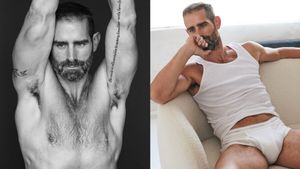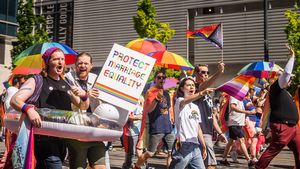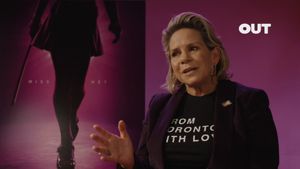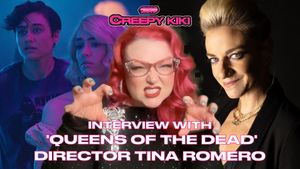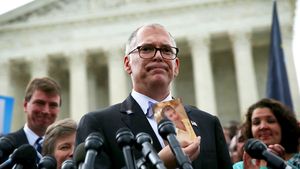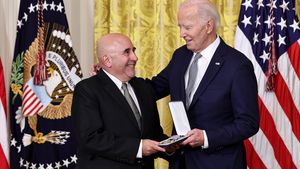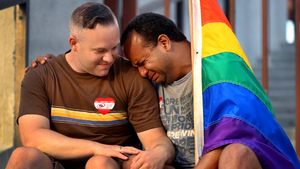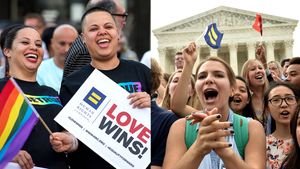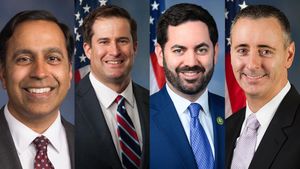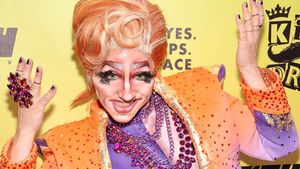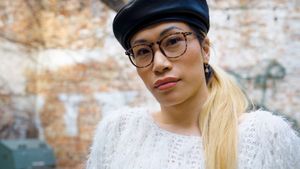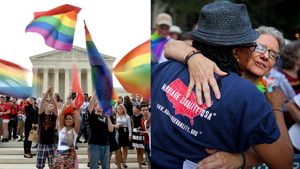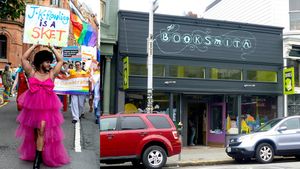Donja R. Love, hailing from Philadelphia, Pennsylvania, is an American playwright and filmmaker who identifies as Afro-Queer and HIV positive. With his work showcased across various states in the U.S., Donja draws deeply from his personal journey with HIV. His 2019 play one in two, inspired by the sobering CDC statistic revealing that one in two Black gay and bisexual men will receive an HIV diagnosis in their lifetime, intimately portrays the experiences of three performers, one of whom reflects Love's own journey of discovering his HIV-positive status. In an exclusive interview, Donja discusses how HIV shapes his artistic vision, his approach to mental health, and how his treatment regimen empowers him to lead a life without limits.
While writing his play one in two, Donja was also approaching the 10-year anniversary of when he was diagnosed with HIV. This wasn’t an anniversary to celebrate; however, as Donja fell into a depression around his status that he hadn’t experienced in a long time.
 Courtesy Lulu Dropo
Courtesy Lulu Dropo
“I thought that I was going to have a level of acceptance, that there was going to be a level of resiliency which I had, because at that point I was two years public with my status and doing advocacy work, and I was gagged by how sad I started to get,” Donja shares. “So, I opened my Notes app and started to write down how I was feeling.”
What came of those Notes app confessions ended up becoming his seminal play; however, Donja originally didn’t plan to release it until he met someone who had just been diagnosed.
“By the time I was done chronicling all of my thoughts and my emotions I said, ‘You will not let anyone see this because you spilled too much tea,’ and I planned for it to just stay on my phone,” Donja recalls. “But lo and behold, I remember I met with a young person who was recently diagnosed and saying to myself, ‘Wow, the things that they're sharing I remember happened to me too.’ I thought of myself and realized that my play doesn’t belong to me. It may have been my testimony, but it’s not just my story.”
 Courtesy Lulu Dropo
Courtesy Lulu Dropo
Sharing his story with others has helped bring attention to many of the issues that people living with HIV still face, including navigating mental health. For Donja, putting his mental health first is paramount.
“I am very quick, in terms of prioritizing my mental health. I am very quick and unapologetic to say that I need to stop right now and that I need to be able to host space with me. I need to be able to recharge and to regroup,” Donja explains. “I think about the work that I do with my writing program for people living with HIV called Write it Out, and every time I'm talking to my writers, I share with them that they can always stop. Whenever the work is getting too intense, whenever you feel yourself becoming mentally weak or unhealthy from the work that you're doing, you can stop.”
Programs like Write it Out offer a great resource for mental health, because they not only mitigate shame caused by stigma, but they also offer community. Donja explains the main battle against stigma and the benefits of finding community and disclosure on mental health.
 Courtesy Lulu Dropo
Courtesy Lulu Dropo
“So many people don't realize that HIV and AIDS still have an impact today. So, that's a level of ignorance that needs to be fixed, and with ignorance there comes stigma, and then shame. And so, with all that being said, people living with HIV and AIDS need to hold space for their mental health,” Donja elucidates. “That can be found in a community. And what I'm talking about now is disclosure, and because of shame and stigma, disclosure is different for everyone living with HIV. But, by aligning yourself with someone who's a possibility model with years of lived experience, you can find your community and the support to disclose.”
Another issue for people living with HIV is access. For Donja, access does not necessarily mean medication, but being treated like a person within the healthcare system.
“I think of my journey living with HIV, as well as the stories told by folks I know living with HIV, that there is a level of care that is missing within the healthcare system,” Donja states. “We need to get to a place where care is brought into the system so that people who are living with HIV don't feel like a statistic, or like a number, but actually feel like a human being.”
 Courtesy Lulu Dropo
Courtesy Lulu Dropo
The one thing that has improved in HIV care is the abundance of treatment options available to use. For Donja, he believes that having these options is a huge step forward for people living different lifestyles.
“There is a wide array of medications and treatments out there, which I think is really amazing. We have the pills, of course, but we also have long-lasting injectables where you can take one shot every month or so, which is incredibly convenient,” Donja explains. “For me, I'm still a one-pill-a-day girl. I remember when I was first diagnosed, I was on three pills, and then I went down to two pills, and now I'm on one pill that I diligently take every evening.”
Adhering to his treatment regimen has helped Donja live without limits, which for him means being unapologetically vocal for himself and his community.
 Courtesy Lulu Dropo
Courtesy Lulu Dropo
“I am not afraid to speak up for myself or others. I'm not afraid to say, ‘No, that doesn't work for me. No, that does not add to my well-being. No, that doesn't add to my spiritual and physical health.’ I am not afraid to just say no,” Donja shares. “I think about those unapologetically living with HIV, individuals who have navigated shame and stigma. They give me the strength to fight for myself and to continue inspiring the old Donja who was just diagnosed.”
Donja concludes, “To see a version of myself on the cover of an HIV and AIDS magazine living life fully seemed unimaginable. But, here I am, and I know that anything is possible.”

 Courtesy Lulu Dropo
Courtesy Lulu Dropo Courtesy Lulu Dropo
Courtesy Lulu Dropo Courtesy Lulu Dropo
Courtesy Lulu Dropo Courtesy Lulu Dropo
Courtesy Lulu Dropo Courtesy Lulu Dropo
Courtesy Lulu Dropo






























